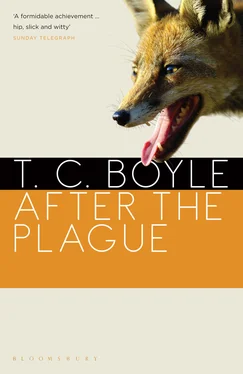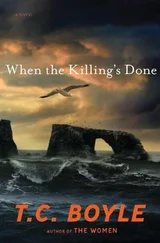She looked at him a long moment, as if debating with herself. “I’m a flyweight, Les,” she said finally. “I fight other flyweights, just like in the men’s division, you know? This is how big God made me, but you come watch me some night and you’ll see it’s plenty big enough.”
She wasn’t smiling, and somewhere on the free-floating periphery of his mind he realized he’d made a blunder. “Yeah,” he said, “of course. Of course you are. Listen, I didn’t mean to — but why boxing? Of all the things a woman could do.”
“What? You think men have a patent on aggression? Or excellence?” She let her eyes sail out over the room, hard eyes, angry eyes, and then she came back to him. “Look, you hungry or what?”
Lester swirled the ice in his drink. It was time to defuse the situation, but quick. “Hey,” he said, smiling for all he was worth, “I’d like to tell you I’m on a diet, but I like eating too much for that — and plus, I haven’t had a thing since that crap they gave us on the plane, dehydrated chicken and rice that tasted like some sort of by-product of the vulcanizing process. So yeah, let’s go for it.”
“There’s a place up the beach,” she said, “in town. I hear it’s pretty good — Los Crotos? Want to try it?”
“Sure,” he said, but the deadness crept back into his legs. Up the beach? In town? It was dark out there, and he didn’t speak the language.
She was watching him. “If you don’t want to, it’s no big deal,” she said, finishing off her drink and setting the glass down with a rattle of ice that sounded like nothing so much as loose teeth spat into a cup. “We can just eat here. The thing is, I’ve been here two days now and I’m a little bored with the menu — you know, fish, fish, and more fish. I was thinking maybe a steak would be nice.”
“Sure,” he said. “Sure, no problem.”
And then they were out on the beach, Gina barefoot at his side, her heels swinging from one hand, purse from the other. The night was dense and sustaining, the lights muted, palms working slowly in the breeze, empty palapas lined up along the high-water mark like the abandoned cities of a forgotten race. Lester shuffled through the deep sand, his outsized feet as awkward as snowshoes, while children and dogs chased each other up and down the beach in a blur of shadow against the white frill of the surf and knots of people stood in the deeper shadows of the palms, laughing and talking till the murmur of conversation was lost in the next sequence of breakers pounding the shore. He wanted to say something, anything, but his brain was impacted and he couldn’t seem to think, so they walked in silence, taking it all in.
When they got to the restaurant — an open-air place set just off a shallow lagoon that smelled powerfully of sea-wrack and decay — he began to loosen up. There were tables draped in white cloth, the waiter was solicitous and grave, and he accepted Lester’s mangled Spanish with equanimity. Drinks appeared. Lester was in his element again. “So,” he said, leaning into the table and trying to sound as casual as he could while Gina squeezed a wedge of lime into her drink and let her shoe dangle from one smooth slim foot, “you’re not married, are you? I mean, I don’t see a ring or anything….”
Gina hunched her shoulders, took a sip of her drink — they were both having top-shelf Margaritas, blended — and gazed out on the dark beach. “I used to be married to a total idiot,” she said, “but that was a long time ago. My manager, Gerry O’Connell — he’s Irish, you know? — him and me had a thing for a while, but I don’t know anymore. I really don’t.” She focussed on him. “What about you?”
He told her he was a widower and watched her eyes snap to attention. Women loved to hear that — it got all their little wheels and ratchets turning — because it meant he wasn’t damaged goods like all the other hairy-chested cretins out there, but tragic, just tragic. She asked how it had happened, a sink of sympathy and morbid female curiosity, and he told her the story of the kid in the Suburban and the wet pavement and how the student volunteers were supposed to have a monitor with them at all times, but not April, because she just shrugged it off — she wanted an authentic experience, and that was what she got, all right. His throat seemed to thicken when he got to that part, the irony of it, and what with the cumulative weight of the cocktails, the reek of the lagoon, and the strangeness of the place — Mexico, his first day in Mexico — he nearly broke down. “I wasn’t there for her,” he said. “That’s the bottom line. I wasn’t there.”
Gina was squeezing his hand. “You must have really loved her.”
“Yeah,” he said. “I did.” And he had loved her, he was sure of it, though he had trouble picturing her now, her image drifting through his consciousness as if blown by a steady wind.
Another drink came. They ordered dinner, a respite from the intensity of what he was trying to convey, and then Gina told him her own tale of woe, the alcoholic mother, the brother shot in the face when he was mistaken for a gang member, how she’d excelled in high-school sports and had nowhere to go with it, two years at the community college and a succession of mind-numbing jobs till Gerry O’Connell plucked her from anonymity and made her into a fighter. “I want to be the best,” she said. “Number One — and I won’t settle for anything less.”
“You’re beautiful,” he said.
She looked at him. Her drink was half gone. “I know,” she said.
By the time they were finished with dinner and they’d had a couple of after-dinner drinks, he was feeling unbeatable again. It was quarter past eleven and the solicitous waiter wanted to go home. Lester wanted to go home too — he wanted to take Gina up to his room and discover everything there was to know about her. He lurched suddenly to his feet and threw a fistful of money at the table. “Want to go?” he said, the words sticking to the roof of his mouth.
She rose unsteadily from her seat and leaned into him while she adjusted the strap of her right heel. “Think we should take a cab?” she said.
“A cab? We’re just at the other end of the beach.”
She was staring up at him, small as a child, her head thrown back to take in the spread and bulk of him. “Didn’t you see that notice in your room — on the bathroom door? I mean, it sounds almost funny, the way they worded it, but still, I wonder.”
“Notice? What notice?”
She fished around in her purse until she came up with a folded slip of paper. “Here,” she said. “I wrote it down because it was so bizarre: ‘The management regrets to inform you that the beach area is unsafe after dark because of certain criminal elements the local authorities are sadly unable to suppress and advises that all guests should take a taxi when returning from town.’ “
“Are you kidding? Criminal elements? This place is a sleepy little village in the middle of nowhere — they ought to try the Tenderloin if they want to see criminal elements. And besides, besides”—he was losing his train of thought—“besides …”
“Yes?”
“There’s nobody in the whole country taller than five-four, as far as I can see.” He laughed. He couldn’t help himself. “Criminal elements!” And he was still shaking his head as they stepped out into the night.
Call it hubris.
They hadn’t gone two hundred yards, the night deepening, dogs howling in the hills, and every star set firmly in its track, when they were jumped. It was nothing like the way Lester had visualized it while stalking home after the bars closed on Twenty-fourth Street, half hoping some sorry shithead would come up to him so he could break him in two. There were no words, no warning, no “Give me your wallet” or “I’ve got a gun” or “This is a stickup.” One minute he was trudging through the sand, a drunken arm draped hopefully over Gina’s shoulder, and the next he was on the ground, two pairs of booted feet lashing diligently at his face and ribs while a whole fluttering rush of activity washed round him, as if a flock of birds had burst up off the ground in a panic. He heard a grunt, a curse, the unmistakable crack of bone and cartilage rearranging itself, and it was Gina, Gina the Puma, whaling away at the shadows with both fists as he shoved himself up out of the sand and the boots suddenly stopped kicking and fled.
Читать дальше












